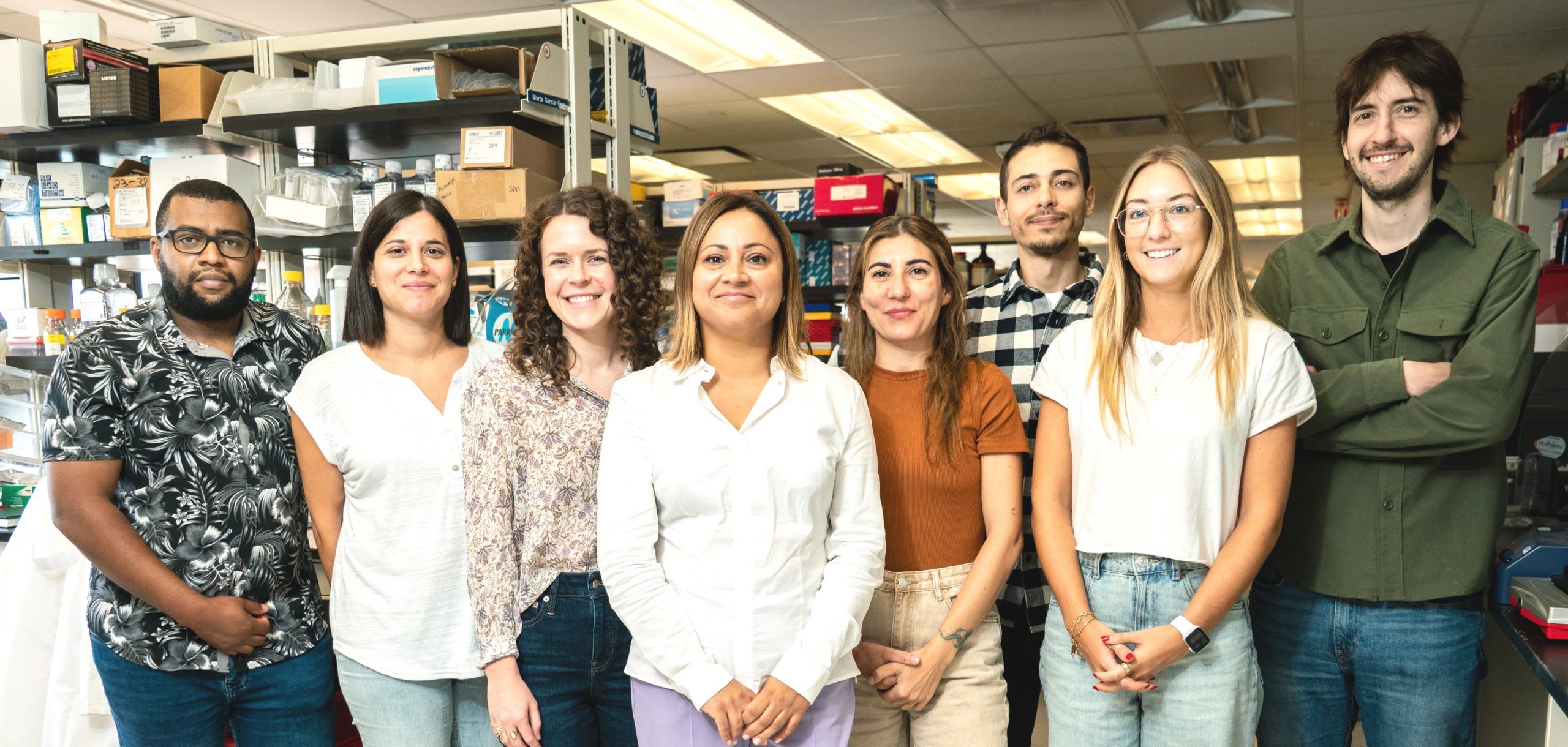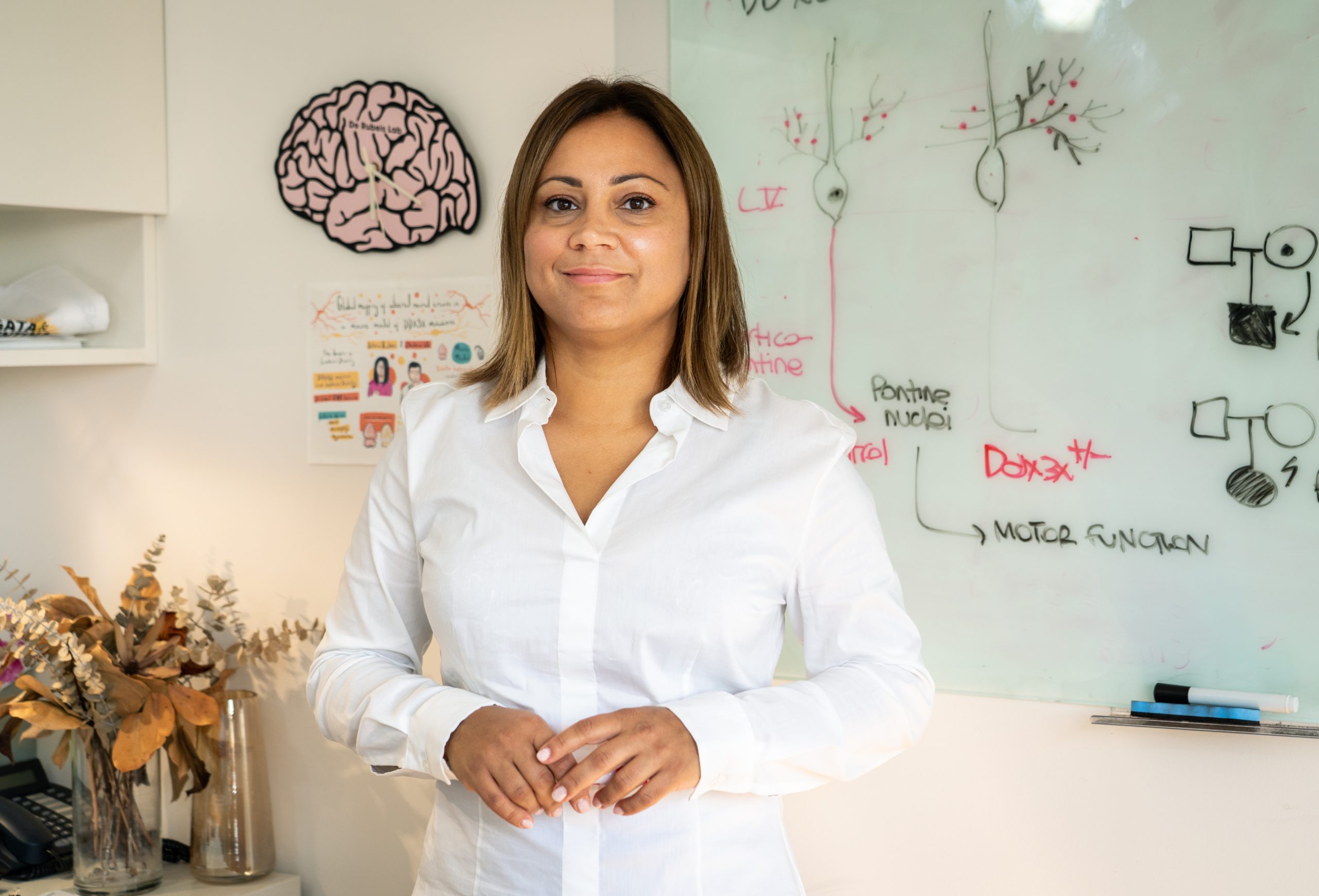We are interested in understanding the developmental defects resulting from disruptive mutations in novel high-risk genes identified from our ongoing large-scale genomic studies in autism (ASD) and intellectual disability (ID). We take a genetics-first approach for functional analyses in cellular and mouse models and we strive to take into account clinically relevant aspects that emerge from patient-based research.
Our current research aims at understanding the cellular and molecular mechanisms underlying DDX3X syndrome, a rare genetic condition associated with ID and ASD manifesting primarily in girls.
We are part of the Seaver Autism Center for Research and Treatment at the Icahn School of Medicine at Mount Sinai in New York. The Seaver Center is a fully integrated translational research center dedicated to discovering the biological causes of autism and intellectual disability and developing breakthrough treatments. The lab is affiliated to the Department of Psychiatry, Mindich Child Health and Development Institute and Friedman Brain Institute.
Our group is part of an interdisciplinary pre-clinical team of geneticists, molecular biologists, stem cell researchers, and neuroscientists and has direct interactions with a clinical team of psychiatrists, psychologists, neurologists, and clinical geneticists.

De Rubeis Laboratory
1468 Madison Avenue
Annenberg Building
Floor 22, Room 38
New York, NY 10029
Office: 212-241-0179
silvia.derubeis@mssm.edu
Current projects
The developmental mechanisms of DDX3X Syndrome
DDX3X syndrome is a recently identified rare form of X-linked ID that accounts for up to 2% of unexplained cases in females. Affected individuals can also present with ASD, hypotonia, movement disorders and brain anomalies.
DDX3X syndrome is caused by mutations in the DDX3X gene, a gene located on the X chromosome. The gene displays sex differences in its expression. Also, DDX3X mutations display a sexual dichotomy: most mutations are found in females and are not inherited from their parents; the few mutations in males are inherited from apparently asymptomatic mothers.
Our research on DDX3X syndrome seeks to elucidate the molecular, cellular and developmental functions of DDX3X to understand how the neurodevelopmental trajectory in DDX3X syndrome goes awry and develop novel therapeutics.
Our research aims to address three major questions.
How do DDX3X mutations affect brain development and complex behaviors?
Individuals with DDX3X syndrome suffers from neurodevelopmental and neurological symptoms. Yet, little is known about the role of DDX3X during neurodevelopment and the consequent impact of DDX3X mutations on cognition and social behavior.
We are exploring the cellular and molecular functions of DDX3X during brain development taking advantage of a new mouse model of DDX3X syndrome we generated (Ddx3x haploinsufficient females). We use standardized behavioral testing in juvenile and adult mice and combine them with cellular and in vivo approaches. Once we identify the mechanisms of DDX3X syndrome and reliable phenotypes in the mouse model, novel therapeutics for DDX3X syndrome can be developed and tested.
What are the determinants of sex specificity of DDX3X syndrome?
Individuals with DDX3X syndrome are mostly females with de novo mutations, namely mutations that are not transmitted by their parents. The few males with DDX3X syndrome described in the literature inherit their mutations from their mothers, who appear asymptomatic or have subclinical deficits. What determine these sex differences? Why do the mothers of the affected males do not have DDX3X syndrome?
To address these intriguing questions, we use male and female neuronal models of DDX3X syndrome. We generate male and female embryonic mouse neurons missing DDX3X and study their development and physiology. These models can be used to understand the neurobiology of DDX3X and develop pre-clinical cellular models for drug discovery and testing.
What are the molecular functions of DDX3X in the brain?
DDX3X is an RNA helicase shown to regulate mRNA translation. The role of DDX3X in mRNA translation has been almost exclusively studied in non neuronal cells.
In neurons, mRNA translation also occurs at synapses, where it rapidly reshapes the local proteome in response to neuronal activity. Synaptic mRNA translation is critical for the formation and plasticity of synapses, and for learning and memory. We use molecular biology and biochemistry techniques to study the molecular complexes and gene targets of DDX3X in neurons, with the goal of identifying new molecular targets for therapeutic intervention.
The genetics of autism spectrum disorder
Enormous progresses have been made in showing that genetics shapes a large fraction of risk for ASD and in identifying specific genes and loci conferring liability. We continue our work with the Autism Sequencing Consortium in aggregating and sequencing large cohorts of individuals with ASD and matched controls collected all over the world.
Team
Silvia De Rubeis, Principal Investigator
 Silvia is a tenured Associate Professor at the Seaver Autism Center for Research and Treatment, Department of Psychiatry, Mindich Child Health and Development Institute, and Friedman Brain Institute at the Icahn School of Medicine at Mount Sinai.
Silvia is a tenured Associate Professor at the Seaver Autism Center for Research and Treatment, Department of Psychiatry, Mindich Child Health and Development Institute, and Friedman Brain Institute at the Icahn School of Medicine at Mount Sinai.
Silvia completed her bachelor, master, and PhD degrees in Cellular and Molecular Biology at the University of Rome Tor Vergata, Italy. During her PhD and first postdoctoral training in Claudia Bagni’s lab at the Katholieke Universiteit Leuven and Vlaams Instituut voor Biotechnologie (Belgium), she studied how the regulation of mRNA translation shapes the synaptic development in the context of Fragile X syndrome. During this training, she visited Eric Klann’s lab at the New York University as an EMBO short-term fellow. She then joined Mount Sinai for a second postdoctoral training in Joseph Buxbaum’s lab. She studied the role of rare genetic variation in autism through large-scale exome sequencing.
Silvia started her independent research lab in 2017.
Silvia is a 2020 Friedman Brain Institute Scholar Award and a 2021 Distinguished Scholar Award from the Icahn School of Medicine at Mount Sinai. Silvia also received a Wilhelm Bessel Research Award from the Alexander von Humboldt Foundation in 2021.
Silvia’s full list of publications here. Silvia describes her role at the Seaver Autism Center for Research and Treatment here.
Alumni
Olivia Pistone
Mahmuda Hannah
David Tawfiles
Ariela Buxbaum Grice
Francois Muratet
Rocio Villena
Amanda de Favre Noguera
Key Publications
Mossa A, Dierdorff L, Lukin J, Garcia-Forn M, Wang W, Mamashli F, Park Y, Fiorenzani C, Akpinar Z, Kamps J, Tatzelt J, Wu Z, De Rubeis S. Sex-specific perturbations of neuronal development caused by mutations in the autism risk gene DDX3X. Nat Commun. 2025 May 15;16(1):4512. doi: 10.1038/s41467-025-59680-8. PMID: 40374608; PMCID: PMC12081640.
Flores MA, Garcia-Forn M, von Mueffling A, Ola P, Park Y, Boitnott A, De Rubeis S. A subpopulation of cortical neurons altered by mutations in the autism risk gene DDX3X. Biol Open. 2025 Jan 15;14(1):bio061854. doi: 10.1242/bio.061854. Epub 2025 Jan 29. PMID: 39878593; PMCID: PMC11815569.
Fiorenzani C, Mossa A, De Rubeis S. DEAD/DEAH-box RNA helicases shape the risk of neurodevelopmental disorders. Trends Genet. 2025 May;41(5):437-449. doi:10.1016/j.tig.2024.12.006. Epub 2025 Jan 18. PMID: 39828505; PMCID: PMC12055483.
Boitnott A, Garcia-Forn M, Ung DC, Niblo K, Mendonca D, Park Y, Flores M, Maxwell S, Ellegood J, Qiu LR, Grice DE, Lerch JP, Rasin MR, Buxbaum JD, Drapeau E, De Rubeis S. Developmental and Behavioral Phenotypes in a Mouse Model of DDX3X Syndrome. Biol Psychiatry. 2021 Dec 1;90(11):742-755. doi:10.1016/j.biopsych.2021.05.027. Epub 2021 Jun 7. PMID: 34344536; PMCID: PMC8571043.
Breen MS, Garg P, Tang L, Mendonca D, Levy T, Barbosa M, Arnett AB, Kurtz-Nelson E, Agolini E, Battaglia A, Chiocchetti AG, Freitag CM, Garcia-Alcon A, Grammatico P, Hertz-Picciotto I, Ludena-Rodriguez Y, Moreno C, Novelli A, Parellada M, Pascolini G, Tassone F, Grice DE, Di Marino D, Bernier RA, Kolevzon A, Sharp AJ, Buxbaum JD, Siper PM, De Rubeis S. Episignatures Stratifying Helsmoortel-Van Der Aa Syndrome Show Modest Correlation with Phenotype. Am J Hum Genet. 2020 Sep 3;107(3):555-563. doi: 10.1016/j.ajhg.2020.07.003. Epub 2020 Aug 5. PMID: 32758449; PMCID: PMC7477006.
Current Openings
We are looking for a postdoctoral fellow!
Funding
Beatrice & Samuel Seaver Foundation
Eunice Kennedy Shriver National Institute of Child Health and Human Development (NICHD)
National Institute for Neurological Disorders and Stroke (NINDS)
Mindich Child Health and Development Institute
Icahn School of Medicine at Mount Sinai
Friedman Brain Institute
Fundación Alfonso Martín Escudero (to Marta Garcia-Forn)
Uplifting Athletes (to Adele Mossa)
New York University Dean’s Undergraduate Fund (to Michael Flores)
New York University Dean’s Undergraduate Fund (to Zeynep Akpinar)
News and events
Join the SURS program summer 2025!
The lab receives a new R21 from NINDS to study cortico-cerebellar communication!
Watch our new lab video!
Silvia receives the Friedrich Wilhelm Bessel Research Award!
Adele receives a 2021 Young Investigator Draft from Uplifting Athletes!
Marta receives a postdoctoral fellowship from Fundación Alfonso Martín Escudero!
Silvia receives a 2021 Distinguished Scholar Award from the Icahn School of Medicine at Mount Sinai!
Silvia receives a 2020 Friedman Brain Institute Scholar Award with Zhuhao Wu!
Follow our Seaver Autism Center Seminar Series here!
Location
Icahn School of Medicine at Mount Sinai
Annenberg 22-38
Phone: 212-241-0179
Office: 212-241-0179
Lab: 212-241-2704
silvia.derubeis@mssm.edu
Related Links
Find a Researcher
Research Portal
Education
Faculty Resources
Student Resources
